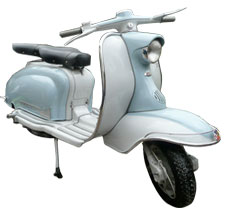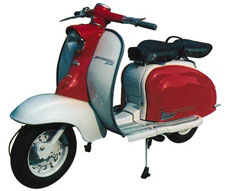Lambretta Model 125-150 Li


125 Li SpecificationsYears produced: 1951 - 1954 (D) |
150 Li SpecificationsYears produced: 1951 - 1956 (LD)Amount produced: 131,665 Engine: 1 cylinder, air cooled 2-stroke Induction: piston ported Bore: 52 mm Stroke: 58 mm Cubic capacity: 123 cc Compression ratio: 6.5:1 BHP at rpm: 5 @ 4600 Transmission: 3 speed (hand) Lubrication: 5% Carburetor: Dellorto 18 B2 or B3 Ignition: contact breaker & points Ignition timing: 26 degrees BTDC Breaker gap: 0.3-0.4 mm Voltage: 6 volt Wheel size: 8" Tire size: 4 x 8 Max speed: 45 mph Total dry weight: 187 lbs |
LAMBRETTA MODEL 125-150 Li HISTORY
Following the new path laid by the 175 TV, Innocenti radically renewed the LD model, which then became the LI available in the now classic sizes of 125 and 150cc. The new body was practically identical to that of the TV apart from the two single seats and the completely painted wheel rims. To differentiate the two-sized scooters, various chrome pieces were applied to each specific model. The 125 was sold in bluish-gray with the possibility of having dark metallic gray side panels. The 150, on the other hand, was available as a two-tone with a base of bluish-gray and a choice of red, blue, green or brown.
The mechanical system was conceptually the same as the 175 TV but was redesigned and simplified using a chain transmission. The gear shifter now used a smooth turning cross that was very reliable and efficient. These new features were applied with only slight changes on the LI and LD for the rest of their production. As with the LD, the level of finishing touches depended on the size of the engine. On the 125cc version, the strips on the floorboards were made of stamped aluminum, some of the handles were just painted, and the odometer and rear seat were optional. On the 150, the strips on the floorboards also had strips of rubber, all the handles were polished, and the odometer and rear seat were standard. Besides that, the 150 was equipped with an electrical current rectifier and a high-capacity six-volt battery.
Although this new scooter was radically different from its predecessor, the Lambretta LI was soon accepted by the huge scootering public and within a few months reached, but did not surpass, the production levels of the glorious LD.
During the time of the LIs construction, constant but sometimes slight modifications were applied. Easily the most important change was the shift of the air duct for the carburetor below the front seat, the addition of a larger chamber for the air intake, and a paper filter like those on automobiles.
With ten-inch wheels and a four-speed gearbox, this speedy Lambretta LI became one of the best road-handling scooters with excellent acceleration and able to travel long distances without a problem.
The considerable power, ability to carry heavy loads, and exceptional mechanical reliability made the Lambretta LI the favorite for hauling heavy loads like gas cylinders and newspaper delivery. At the time of the introduction of the revamped LI second series in October 1959, the first LI would be identified as the first series.
